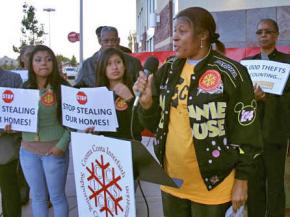Can Richmond help homeowners?
reports on efforts by activists and some elected officials in Richmond, Calif., to help struggling homeowners--and Wall Street's attempts to stop them.
BATTLE LINES were clearly drawn as more than 300 people packed a Richmond, Calif., City Council hearing September 10 to weigh in on the fate of the Richmond CARES program to help underwater homeowners.
On one side were advocates of the plan, many of them from the Richmond Progressive Alliance and the Alliance of Californians for Community Empowerment (ACCE), who wore ACCE's yellow shirts. The other side, which wore red, included mostly representatives of the real estate industry and their lackeys. By the end of the night, after seven hours of testimony, the City Council had taken two votes to move the plan ahead.
Richmond CARES would take 624 home loans away from the investors who own them, allowing the city to write down the balance to fair market value so underwater homeowners can afford to make the payments. In a city ravaged by foreclosures, where 47 percent of homeowners with mortgages are underwater--meaning they owe more than their homes are worth--the program would stop foreclosures before they start. It would also restore equity to working class homeowners whose wealth was wiped out during the Great Recession, and still has not been restored.

"Richmond and its residents have been badly harmed by this housing crisis," Mayor Gayle McLaughlin, a Green Party member and strong supporter of the plan, told the Huffington Post. "The banks have been unwilling or unable to fix this situation, so the city is stepping in to provide a fix."
Richmond's City Manager Bill Lindsay took the first step in implementing the plan in late July when he sent letters to the investors holding the loans, offering to purchase them at slightly below market value, using capital from investors Mortgage Resolution Partners (MRP). If they refuse, the city is proposing to invoke eminent domain to take the loans anyway. So far, no investor has agreed to the city's purchase offer.
THE FIRST vote up for discussion at the City Council meeting was conservative council member Nathaniel Bates' proposal to withdraw the city's offer to purchase the underwater loans. If it had passed, the proposal would have killed Richmond CARES, but it was defeated resoundingly by a 5-2 margin.
The second vote authorized the city to establish a Joint Powers Authority (JPA) with any city willing to consider eminent domain to seize underwater loans. The JPA would shield individual cities from litigation by deep-pocketed banks and investors seeking to block the plan, allowing multiple municipalities to stand together in one legal entity.
The threat of litigation isn't hypothetical. Banking behemoths like Wells Fargo and Deutsche Bank, major investors BlackRock, Pacific Investment Management and DoubleLine Capital LLP, along with the federally backed enterprises Fannie Mae and Freddie Mac, sued Richmond and MRP in federal court last month. But in another victory for housing activists, last week, Judge Charles Breyer threw out the lawsuit.
Because Richmond has not yet voted to invoke eminent domain, something that according to state law the city would need a supermajority on the City Council to do, Breyer ruled that the lawsuit was premature and depended on "future events that may never occur."
The ruling, however, does not preclude another lawsuit once Richmond does vote to invoke eminent domain, making it important for activists all over California to pressure their city governments to sign on to the JPA and consider using eminent domain to buy underwater home loans.
The fight could go either way. San Bernardino County in Southern California considered a similar plan to Richmond CARES last year but caved to pressure by Wall Street. The city of North Las Vegas recently did the same.
But with a strong community campaign in Richmond taking the program further than any other municipality, there is an opening for other cities to step in and build support. The City Council of El Monte, in Southern California, is now considering signing on to the JPA; and in San Francisco, Supervisor David Campos has introduced a resolution supporting Richmond CARES and researching the potential for a similar program there. The measure now has a number of co-sponsors.
Campos stood on the steps of San Francisco City Hall for a press conference earlier this month, flanked by dozens of members of San Francisco ACCE, and pushed for local governments to take up the fight for housing justice. As he said, "Our strategies have been, 'Let's see what the federal government or the banking industry will do to help these folks.'...We've waited long enough."


